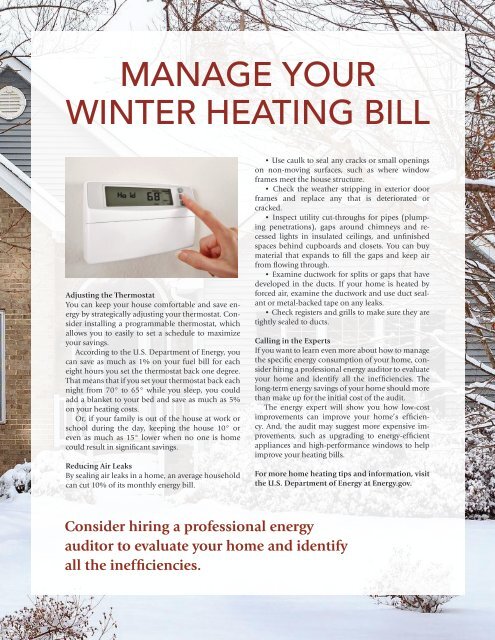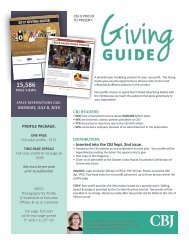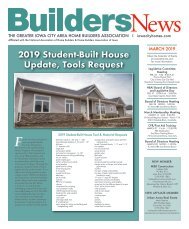Threshold Dec. 18
You also want an ePaper? Increase the reach of your titles
YUMPU automatically turns print PDFs into web optimized ePapers that Google loves.
MANAGE YOUR<br />
WINTER HEATING BILL<br />
Adjusting the Thermostat<br />
You can keep your house comfortable and save energy<br />
by strategically adjusting your thermostat. Consider<br />
installing a programmable thermostat, which<br />
allows you to easily to set a schedule to maximize<br />
your savings.<br />
According to the U.S. Department of Energy, you<br />
can save as much as 1% on your fuel bill for each<br />
eight hours you set the thermostat back one degree.<br />
That means that if you set your thermostat back each<br />
night from 70° to 65° while you sleep, you could<br />
add a blanket to your bed and save as much as 5%<br />
on your heating costs.<br />
Or, if your family is out of the house at work or<br />
school during the day, keeping the house 10° or<br />
even as much as 15° lower when no one is home<br />
could result in significant savings.<br />
Reducing Air Leaks<br />
By sealing air leaks in a home, an average household<br />
can cut 10% of its monthly energy bill.<br />
• Use caulk to seal any cracks or small openings<br />
on non-moving surfaces, such as where window<br />
frames meet the house structure.<br />
• Check the weather stripping in exterior door<br />
frames and replace any that is deteriorated or<br />
cracked.<br />
• Inspect utility cut-throughs for pipes (plumping<br />
penetrations), gaps around chimneys and recessed<br />
lights in insulated ceilings, and unfinished<br />
spaces behind cupboards and closets. You can buy<br />
material that expands to fill the gaps and keep air<br />
from flowing through.<br />
• Examine ductwork for splits or gaps that have<br />
developed in the ducts. If your home is heated by<br />
forced air, examine the ductwork and use duct sealant<br />
or metal-backed tape on any leaks.<br />
• Check registers and grills to make sure they are<br />
tightly sealed to ducts.<br />
Calling in the Experts<br />
If you want to learn even more about how to manage<br />
the specific energy consumption of your home, consider<br />
hiring a professional energy auditor to evaluate<br />
your home and identify all the inefficiencies. The<br />
long-term energy savings of your home should more<br />
than make up for the initial cost of the audit.<br />
The energy expert will show you how low-cost<br />
improvements can improve your home’s efficiency.<br />
And, the audit may suggest more expensive improvements,<br />
such as upgrading to energy-efficient<br />
appliances and high-performance windows to help<br />
improve your heating bills.<br />
For more home heating tips and information, visit<br />
the U.S. Department of Energy at Energy.gov.<br />
Consider hiring a professional energy<br />
auditor to evaluate your home and identify<br />
all the inefficiencies.<br />
THRESHOLD DECEMBER 20<strong>18</strong> 7
















